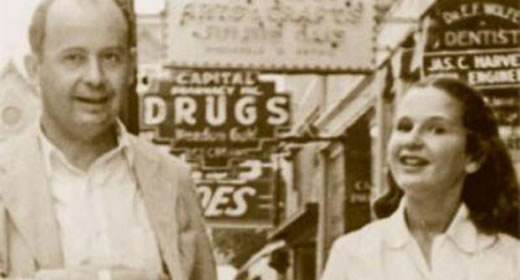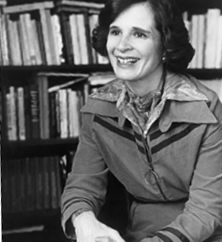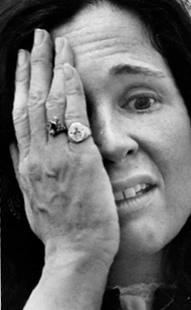
In The Martian's Daughter: A Memoir, economist Marina Whitman talks candidly about her life, her work, and stepping outside of her famous father's shadow
In the fall of 1970, Marina von Neumann Whitman, unnerved by a tight deadline, burst into the office of Paul McCracken, then chairman of the president's Council of Economic Advisers (CEA). McCracken had invited the rising young economist to join his staff for a year—in a position that would set the stage for a series of increasingly prominent government appointments. Faced with a routine finance report and a conflicting personal obligation (her brother's wedding), Whitman sought reassurance from her mentor that she was up to the job—an unfounded insecurity that belied her professional achievement.
She was the daughter of renowned mathematician and "Martian" John von Neumann, one of the five Hungarian Jewish scientists who immigrated to the United States from Budapest in the early 1930s and made seminal contributions in the fields of math and physics. Four of them, including von Neumann, were key members of the Manhattan Project and would alter the course of World War II. By the time she became a senior staff economist at the CEA, Whitman, on leave from her tenured professorship at the University of Pittsburgh, had already begun to create a professional reputation distinct from her father's.
But she had never worked alongside the country's foremost economic thinkers on matters of international policy that would go straight to the president's desk—all while maintaining a marriage and raising two small children. No woman had.
In The Martian's Daughter: A Memoir (forthcoming September 2012 from University of Michigan Press) Whitman recounts what it was like growing up as von Neumann's daughter in an intellectual and often glamorous milieu, and the process of carving a path for herself—even when that meant defying her dying father's expectations by marrying young and defying society's expectations by building a career while raising a family.
"How do you define yourself in the face of larger-than-life parents—particularly my father—and very dominant and, to some extent, contradictory expectations, including my own but also my father's, my mother's, and society's?" She had come of age mid-century as a female economist specializing in international trade. "I think it's important to show people who are younger than I am, which is most of the world, how recent the changes they take for granted have been."
As a result, the book is neither personal memoir nor intellectual biography, but both, as well as an insightful commentary on an experience Whitman has had multiple times: being first.
On that day in 1970, Whitman's nervousness quickly subsided as she recalled the expertise that had gotten her the job. During that whirlwind year of accomplishment as a CEA staffer, she joined a working group led by Paul Volcker drafting policy recommendations that eventually would help reshape international monetary and financial systems. She also advocated for liberalized trade agreements and presciently warned of America's myopia regarding global competition and the country's weakening economic dominance.
This early work would lead her to become a member of the National Price Commission and, in 1972, the first woman appointed as a member of the threeperson Council of Economic Advisers. In his official announcement—which included a press conference, a photo op, and mentions of other high-level women in his administration—Richard Nixon seized the opportunity to make hay both of Whitman's accomplishments as an economist and the fact that she is a woman. "I became the first woman ever on the council, which caused the journalistic world to go into an eruption of talk about what I looked like and that my eye shadow matched my dress. Some woman from the Pittsburgh Press wanted to know how my daughter's gerbil survived the trip to Washington.
"But I joined the CEA, and I loved it," she continues. "I was the spokesperson on price controls which is awkward in a way because a) I didn't believe in them and b) eventually it was clear that they were going to fail. At the same time, we were trying to put the international exchange rate system back together again after Nixon blew it to smithereens."
Whitman later worked for General Motors in different capacities—first as the company's vice president and chief economist—and became the highest-ranking female executive in the auto industry. Her role, as she saw it, was "windows in and windows out trying to explain GM to the world and the world to GM."

As host of a PBS program, Economically Speaking, in 1978–79.
Explaining GM to the world was hard enough, but it was easier than convincing the automaker of the harsh realities of a global economy. In the early 1980s, GM was still the largest corporation in the world and most of its sales were domestic. So Whitman's argument—that focusing on U.S. sales while turning a blind eye to foreign markets would backfire—wasn't entirely persuasive. "To some extent I persuaded the chairman, to some extent," Whitman remembers, "that as a multinational company, however attractive limits on imports might be in the short term, from the point of view of a company that wanted to operate in a whole lot of countries, this was not a good idea."
When considering which of her contributions might be the most significant, however, Whitman does not cite trailblazing at General Motors—nor her own research or policymaking at the CEA.
She sees her role as having been front and center in a transitional generation. This cohort either coaxed social change from inside the places where policy decisions are made or demanded it from outside—a generation that demarcated before this and after this. "I literally transitioned from the world in which women were secretaries and were not allowed to matriculate at the Harvard Business School to a world in which we have women who are CEOs of corporations. Not a lot, but some. And I'm the in-between."
Excerpt, from Chapter 6 "He's Going to Drop a Bomb"
I got a call from someone in the personnel office of the White House, asking me if I would be willing to be nominated as a member of the Council of Economic Advisers.
Wow! Here I was being offered a chance to leap from the Price Commission's increasingly tedious wrangling over arcane details into a role that was focused on the big issues affecting the U.S. and even the global economies. Yet that call from the White House threw me into the most painful emotional turmoil of my adult life. Never before had professional opportunity collided so sharply and painfully with my commitment to my family. For someone as personally ambitious and eager to make a difference in the world of policy as I was, being a presidentially appointed member of the Council charged with advising the President and reporting to the Congress on economic policy was literally my dream job. And its pull was even stronger because decisions on the wage-price control program and negotiations on the reform of the international monetary system, the two areas where I had the greatest interest and expertise, were sure to be front and center during 1972."

"I'm caught anything but smiling as I describe the state of the economy to the press in 1973."
I returned to earth with a thud as I thought about the practical obstacles to my taking the job. Bob and I had just returned to the University of Pittsburgh from sabbatical leaves—normally granted once every seven years—and Malcolm and Laura had just returned to the schools and the lives we had disrupted by taking them to Washington the year before. Although I would probably be granted another year off, because of the prominence of the position I would fill, Bob was Chairman of the English Department, not a job from which he could take a leave of uncertain duration. After having expressed so volubly my anxieties about the progress of his career during the early years of our marriage, how could I now ask him to relinquish the chairmanship of a large department for an unpaid leave of absence? And, with children aged twelve and eight, the idea of being a commuting mother away from them most of the time was unthinkable.
No amount of agonizing came up with a solution to my dilemma. So after crying into my pillow for several nights, beset by the fear that my father's dire predictions about the penalties I would pay for early marriage might be coming true, I told Bob one Friday that I would call the White House personnel office on Monday morning to express my regret at being unable to let my name go forward. He was as torn as I was; he shared fully my delight at this tailormade opportunity, and he knew how much I would be sacrificing if I turned it down. I would be giving up not only a year or two of full involvement in issues of national policy I cared deeply about, but also a stepping-stone to who knew what future career opportunities.
Years later, Bob told me that he had already decided in his own mind that my career should take precedence over his in family decision-making, and I'm still touched to the core by the depth of unselfishness this courageous decision had entailed. But his efforts to find a workable compromise had so far come up as empty-handed as mine, and our discussion was cut short when he had to go off to chair the monthly Friday afternoon meeting of the English Department.
The resolution of our dilemma came from an unexpected source. Bob came home from the lengthy department meeting spluttering with anger and frustration. There was one particular professor in the English department, an Australian with greasy hair, bad teeth, and a strong body odor, who took pride in matching his behavior to his appearance, being as contrarian and unpleasant as possible in every situation. Apparently his talents had been in full swing that afternoon, turning the meeting into a shambles. After muttering imprecations against the said Jim Simmons for several minutes, Bob said "To hell with the chairmanship! Let's go to Washington." Filled with gratitude and relief, I accepted the offer."
Excerpt from: The Martian's Daughter: A Memoir by Marina von Neumann Whitman, copyright by the University of Michigan Press 2012. The book will be available in September 2012 from local booksellers or from University of Michigan Press: www.press.umich.edu.
Below is a formatted version of this article from State & Hill, the magazine of the Ford School. View the entire Spring 2012 State & Hill here.